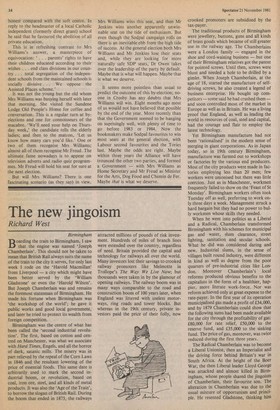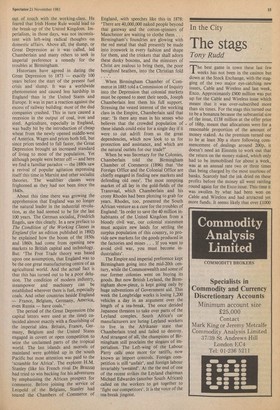The new jingoism
Richard West
Birmingham Boarding the train to Birmingham, I saw that the engine was named 'Joseph Chamberlain'. This should not be taken to mean that British Rail always suits the name of the train to the city it serves, for only last week I rode on the 'Harold Macmillan' from Liverpool — a city which might have been better served by the 'William Gladstone' or even the 'Harold Wilson'. But Joseph Chamberlain was and remains the foremost statesman of Birmingham. He made his fortune when Birmingham was 'the workshop of the world'; he gave it public works and good local government, and later he tried to protect its wealth from foreign competition.
Birmingham was the centre of what has been called the 'second industrial revolution'. The first, based on cotton and centred on Manchester, was what we associate with Hard Times, Engels, and all the horror of dark, satanic mills. The misery was in part relieved by the repeal of the Corn Laws in 1846 and the resultant lowering of the price of essential foods. This same date is arbitrarily used to mark the second industrial boom, or revolution, based on coal, iron ore, steel, and all kinds of metal products. It was also the 'Age of the Train', to borrow the slogan of British Rail. During the boom that ended in 1873, the railways attracted millions of pounds of risk investment. Hundreds of miles of branch lines were extended over the country, regardless of need. Britain provided the capital and technology for railways all over the world. Many investors lost their savings to crooked railway promoters like Melmotte in Trollope's The Way We Live Now; but thousands were taken in by the glamour of opening railways. The railway boom was in many ways comparable to the road and construction boom of 100 years later, when England was littered with useless motorways, ring roads and tower blocks. But whereas in the 19th century, private investors paid the price of their folly, now crooked promoters are subsidised by the tax-payer.
The traditional products of Birmingham were jewellery, buttons, guns and all kinds of brass goods which became of still greater use in the railway age. The Chamberlains were a London family — engaged in the shoe and cord-waining business — .but one of their Birmingham relatives got the patent for pointed screws. Until then, screws were blunt and needed a hole to be drilled by a gimlet. When Joseph Chamberlain, at the age of 18, started the manufacture of selfdriving screws, he also created a legend of business enterprise. He bought up competitors —some said he had crushed them— and soon controlled most of the market in Europe as well as in Britain. He was a living proof that England, as well as leading the world in resources of coal, steel and capital, had the courage and flair to employ the latest technology.
Yet Birmingham manufacture had not been 'rationalised' in the modern sense of merging in giant corporations. As in Japan today, so in 19th century Birmingham, manufacture was farmed out to workshops or factories by the various end producers. Most of the city products were made in factories employing less than 20 men; few workers were unionised but there was little coercion. Just as in Manchester, workmen frequently failed to show on the 'Feast of St Monday'. Birmingham workers often took Tuesday off as well, preferring to work only three days a week. Management struck a hard bargain but they had no power to bully workmen whose skills they needed.
When he went into politics as a Liberal and a Radical, Chamberlain transformed Birmingham with his schemes for municipal gas and water, slum clearance, street lighting, sanitation and secular schools. What he did was considered daring and new. Industrial slums, in the sense of villages built round industry, were different in kind as well as degree from the poor quarters of pre-industrial cities like London. Moreover Chamberlain's local reforms produced obvious benefits to the capitalists in the form of a healthier, happier, more literate work-force. Nor was reform achieved only at great expense to the rate-payer. In the first year of its operation municipalised gas made a profit of £34,000, and by 1879 Chamberlain could show that the following sums had been made available for the city through the profitability of gas: £80,000 for rate relief, £50,000 to the reserve fund, and £35,000 to the sinking fund. The price of gas, moreover, was twice reduced during the first three years.
The Radical Chamberlain was to become a Liberal Unionist, then an Imperialist and the driving force behind Britain's war in South Africa. At the height of the Boer War, the then Liberal leader Lloyd George was attacked and almost killed in Birmingham, whose people shared the jingoism of Chamberlain, their favourite son. The alteration in Chamberlain was due to the usual mixture of opportunism and principle. He resented Gladstone, thinking him out of touch with the working-class. He feared that Irish Home Rule would lead to the break-up of the United Kingdom. Imperialism, in those days, was not inconsistent with left-wing radical thoughts on domestic affairs. Above all, the slump, or Great Depression as it was called, led Chamberlain and many others to seek in imperial preference a remedy for the troubles at Birmingham.
Historians have agreed in dating the Great Depression to 1873 — exactly 100 years before the start of the present fuel crisis and slump. It was a worldwide phenomenon and caused less hardship in England than in the United States and Europe. It was in part a reaction against the excess of railway building: most of the dud companies crashed. This in turn caused a recession in the output of coal, iron and steel. Agriculture, especially in England, was badly hit by the introduction of cheap wheat from the newly opened middle-west of America. Wages and prices both fell, but since prices tended to fall faster, the Great Depression brought an increased standard of living to most of the population. Yet although people were better off — and here we find a familiar paradox — the 1880s saw a revival of popular agitation expressing itself this time in Marxist and other socialist theories. The wealthier classes were frightened as they had not been since the 1840s.
About this time there was growing the apprehension that England was no longer the natural leader in the industrial revolution, as she had seemed to be for the last 100 years. The German socialist, Friedrich Engels, saw this clearly. In a new preface to The Condition of the Working Classes in England (for an edition published in 1892) he explained how the boom of the 1850s and 1860s had come from opening new markets to British capital and technology. But: 'The Free Trade theory was based upon one assumption, that England was to be the one great manufacturing centre of an agricultural world. And the actual fact is that this has turned out to be a poor delusion. The condition of modern industry, steampower and machinery can be established wherever there is fuel, especially coals. And other countries beside England — France, Belgium, Germany, America, even Russia — have coals.'
The period of the Great Depression (the capital letters were used at the time) coincided almost exactly with a flourishing of the imperial idea. Britain, France, Germany, Belgium and the United States engaged in covert or open competition to seize the unclaimed parts of the tropical world. The last islands and morsels of mainland were gobbled up in the south Pacific but most attention was paid to the 'scramble for Africa'. The explorer H.M. Stanley (like his French rival De Brazza) had tried to win backing for his adventures by emphasising the African prospect for commerce. Before joining the service of Leopold of the Belgians, Stanley had toured the Chambers of Commerce of England, with speeches like this in 1878. 'There are 40,000,000 naked people beyond that gateway and the cotton-spinners of Manchester are waiting to clothe them . . . Birmingham's foundries are glowing with the red metal that shall presently be made into ironwork in every fashion and shape for them, and the trinkets that shall adorn these dusky bosoms, and the ministers of Christ are zealous to bring them, the poor benighted heathen, into the Christian fold When Birmingham Chamber of Commerce in 1885 told a Commission of Inquiry into the Depression that colonial markets must be opened to meet their needs, Joseph Chamberlain lent them his full support. Stressing the vested interest of the working class in the Empire, Chamberlain said that year: 'Is there any man in his senses who believes that the crowded population of these islands could exist for a single day if it were to cut adrift from us the great dependencies, which now look to us for protection and assistance, and which are the natural outlets for our trade?'
When he was Secretary for the Colonies, Chamberlain told the Birmingham Chamber of Commerce (1896) that 'the Foreign Office and the Colonial Office are chiefly engaged in finding new markets and defending old ones'. The most tempting market of all lay in the gold-fields of the Transvaal, which Chamberlain and his crony Rhodes had been plotting to grab for years. Rhodes, too, presented the South African venture as a cure for the troubles of England: 'In order to save the 40 million inhabitants of the United Kingdom from a bloody civil war, our colonial statesmen must acquire new lands for settling the surplus population of this country, to provide new markets for the goods produced in the factories and mines . . . If you want to avoid civil war, you must become industrialists'.
The Empire and imperial preference kept Birmingham going into the mid-20th century, while the Commonwealth and some of our former colonies went on buying its goods. But now British Leyland, the Birmingham show-piece, is kept going only by huge subventions of Government aid. This week the Longbridge works is losing 1,200 vehicles a day in an argument over the length of a tea-break. The once derided Japanese threaten to take over parts of the Leyland complex. South Africa's car manufacturers are luring Leyland workers to live in the Afrikaner state that Chamberlain tried and failed to destroy.
And strangest of all, the champions of Birmingham still proclaim the slogans of im perialism. The Left-wing of the Labour Party calls once more for tariffs, now known as import controls. Foreign com petition is still 'unfair', and foreign labour invariably 'sweated'. At the the end of one of the recent strikes the Leyland chairman Michael Edwardes (another South African) called on the workers to get together to 'fight our competitors'. It is the voice of the tea-break jingoist.











































 Previous page
Previous page